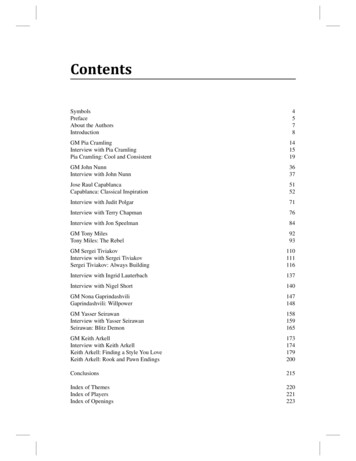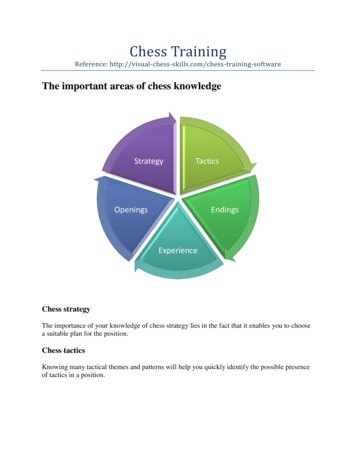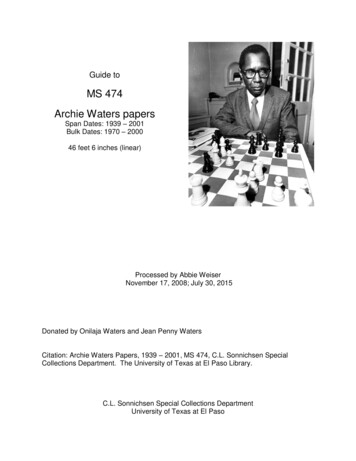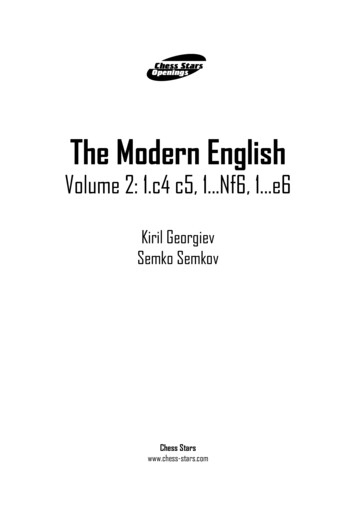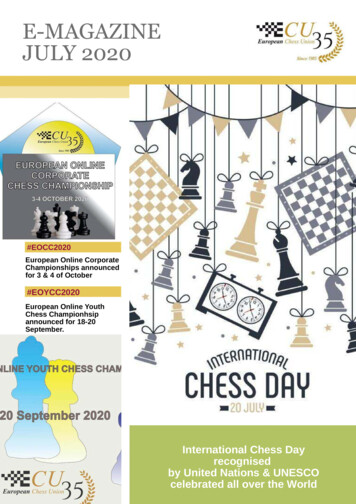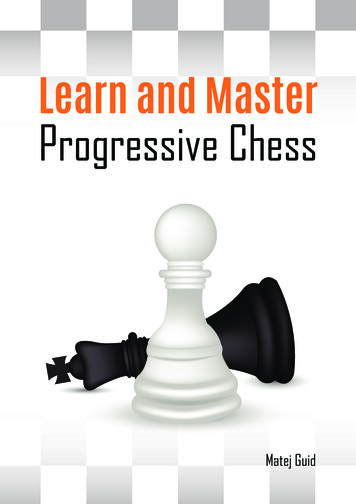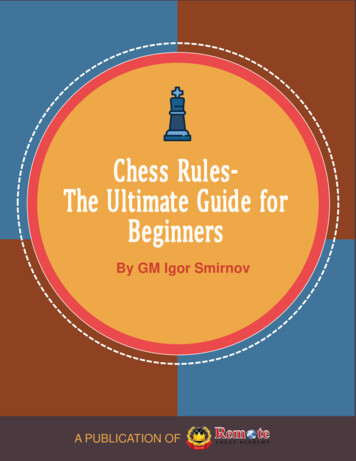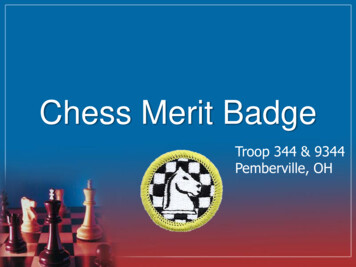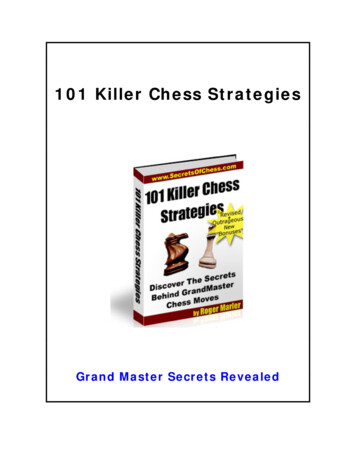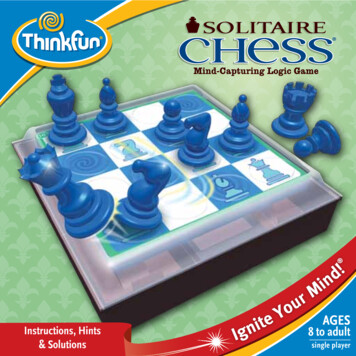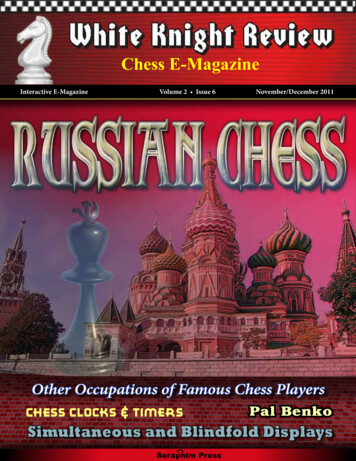
Transcription
Chess E-MagazineInteractive E-MagazineVolume 2 Issue 6November/December 2011Other Occupations of Famous Chess PlayersChess Clocks & TimersPal BenkoSimultaneous and Blindfold DisplaysCSeraphim Press
White KnightReviewChess E-MagazineTable of ContentsEDITORIAL- “My Move”3FEATURE- Russian Chess4BIOGRAPHY- Pal Benko12ARTICLE- Chess Progam 4.14ARTICLE- Chess ClocksTime Honored Tradition16FEATURE-Occupations of Famous Players18ARTICLE- Math and Chess22contentsINTERACTIVECONTENT Click on title inTable of Contentsto move directly topage. Click on “WhiteKnight Review” onthe top of eachpage to return toTable of Contents.ARTICLE- News Around the World23 Click on red type tocontinue to nextpageFEATURE- Simultaneous/Blindfold Displays24 Click on ads to goto their websitesARTICLE - Pandolfini’s Advice27 Click on email toopenup email programBOOK REVIEW-Karpov’s Strategic Wins 11961-1985- The Making of a Championby Tibor Karolyi28ANNOTATED GAME -Hampyuk -29COMMENTARY- “Ask Bill”31Anatoluy KarpovNovember/December 2011 Click up URLs togo towebsites.
White Knight ReviewNovember/December2011My Movejerry wall@comcast.neteditorial -Jerry WallWell it has been over ayear now since we startedthis publication. It is noteasy putting together a 32page magazine on chessevery couple of months butit certainly has beenrewarding (maybe not somuch financially but thenthat really never was the goal).We wanted to put together a different kind ofchess publication that wasn’t just diagrams,problems, analytical moves and such. We wantedto talk about Chess’s rich history, human intereststories, current news and some of its colorfulplayers and characters. We have had articles fromchess apps for the iPhone and iPad to chessconvicts, crooks, spies and the seedy side of life.We have explored chess computers and chessgame variations, street chess, tournament chess,and even prison chess.This coming year we hope to develop evenmore exciting stories and articles about chess.Many of Bill Wall’s articles can also be found atchess.com.This month we look at the rich history of chessin the Soviet Union. Chess has always been a hugepart of the Russian culture and some of the topChess masters and grandmasters have come fromRussia.To me, one of my favorite articles is theOccupations and distinctions of famous ChessPlayers. It is interesting to see the widebackground of many great players. So Enjoy andthank you for your support.Jerry WallEditorLet us know what you think of the magazine. Perhaps you havesome suggestions for future articles or have other comments.Let us know and drop me a line at:editor@offthewallchess.comWhite KnightReviewChess E-MagazineExecutive Editor/WriterBill Wallbill wall@bellsouth.netPublisher /Editor/ CreativeDirectorGerald Walljerry wall@comcast.netProduction/ MarketingSteve Wallinfo@offthewallchess.comFor Subscriptionsubscription@offthewallchess.comFor Advertising Ratesadvertising@offthewallchess.com Copyright 2011All Rights Reserved.Unauthorized reproduction,in any manner is prohibitedwithout expressed permissionfrom the Author or Editor.www.offthewallchess.com3
White Knight ReviewNovember/December 2011FeatureChess was probably introducedin Russia in the 9th century ADthrough the Caspian-Volga traderoute. At the time, there was a Volgatrade route to Baghdad.In the 10th century, chess reachedRussia from Byzantium and from theVikings.Around 1262, the Russian word forchess, “shakhmatny”, was introduced.In 1551, Ivan IV “the Terrible”(1530-1584) banned chess in Russia.In 1584, Ivan was preparing to playa game of chess with Bogdan Belsky,when he fainted suddenly and died of astroke.In 1791, the first chess book waspublished in Russia. It was a translationof Benjamin Franklin’s Morals of Chessand published in St. Petersburg. Thetitle was Pravila dlia Shashechnoi Igry(Rules for the Game of Chess).In 1794, Alexander DmitrievichPetrov was born in Viserovo, Russia. Hebecame the first strong Russian chessplayer, chesscomposer,and chesswriter. Hewas theauthor of thefirst chesshandbookin Russian,Shakmatnayaigra,Alexander Dmitrievich Petrovpublishedin St.Petersburg in 1824. He died in 1867.In 1813, Carl Friedrich AndreyevichJaenisch (YAY-nish) was born inVyborg, Russia. He was an Major inthe Russian army. In the 1840s, hewas among the top chess players of theworld. His work on chess openingsis regarded as the birth of modernopenings theory. He died in 1872.In 1819, Ilya Shumov was born. Hewas one of the first serious Russianchess players. In 1867, he published thefirst book on chess compositions. Hedied in 1881.4In 1821, the first Russian chess bookwas published by Ivan Butrimov (17821851).In 1824, Alexander Petrov wrote ASystemized Game of Chess togetherwith the Games of Philidor and aCommentary on them. It was thefirst classical book about chess inRussian. The book was published in St.Petersburg.In 1827, Prince Sergey Urusov wasborn in Russia. He became a MajorGeneral in the Russian Army. TheUrusov Gambit (1.e4 e5 2.Bc4 Nf6 3.d4)is named after him. He died in 1897In 1838, Jaenisch was a major inthe Russian army. He started writing abook on chess openings.In 1840, Jaenisch left the Russianarmy to concentrate full time in writinga book on chess openings.In 1842, Jaenisch published AnalyseNouvelle des ouvertures du jeu desEchecs (A New Analysis of ChessContinue
White Knight ReviewOpenings). Volume one was publishedin Dresden in French. In 1843, volumetwo was published in St. Petersburg.In 1844, thefirst chess matchbetween twomasters in Russiawas held. CarlJaenisch playedAlexander Petrov.They each won onegame each.Carl JaenischIn 1849, Jaenisch defeated IlyaNovember/December2011police.In 1866, the first chess matchbetween masters in Moscow wasplayed. Sergey Urusov defeated PhilippHirschfeld (1840-1896) in a match withtwo wins, two draws, and one loss.In 1867, Ilya Shumov published thefirst book in the world about chesscompositions. It was published in St.Petersburg.In 1881, Chigorin defeated Alapinin a match with two wins and one loss,held in St. Petersburg.In 1850, Emmanuel StepanovichIn 1875, Szymon Winawer defeatedIn 1851, Shumov defeated Jaenisch ina match with two wins.In 1853, Petrov defeated SergeyUrusov in a match with 3 wins anda draw. The match was held in St.Petersburg. Later that year, Urusovdefeated Shumov in a match with 4 winsand 3 losses.In 1854, the charter of thePetersburg Society of Chess Amateurswas created. Members includedShumov, Urusov, and Viktor Mikhailov.In 1859, Russia’s first Russian chessmagazine, Shakhmatny Listok, (ChessNewsletter) was published. It lasteduntil 1863. The editor was ViktorMikhailov.In 1862, Ignatz Kolisch defeatedIlya Shumov in a match with 6 winsand 2 losses. The match was held in St.Petersburg. That same year, Kolischdrew with Sergey Urusov with 2 winsand 2 losses.In 1862, the St. Petersburg ChessClub was disbanded by the RussianIn 1880, Chigorin organized the firstIn 1874, Emmanuel Schiffersat the Cafe Dominika in St. Petersburg.in a match with two wins and a loss.The match was held in St. Petersburg.In 1850, Mikhail Ivanovich Chigorinwas born in Gatchina, Russia. He wasthe first public chess worker, organizer,and journalist in Russia.Shiffers in a match for the Russianchampionship. Chigorin won with 7wins, 4 losses, and 2 draws.chess club in Russia. The club was in St.Petersburg.In 1850, Shumov defeated JaenischSchiffers was born in St. Petersburg,Russia. He was the Russian chesschampion for 10 years. Schiffers wasknown as “Russia’s Chess Teacher.” Hedied in 1904.In 1879, Chigorin defeatedIn 1873, Chigorin was hustling chessdefeated Andrey Chardin in a matchwith 5 wins and 4 losses. The match washeld in St. Petersburg. Schiffers wasconsidered the Russian champion untilhis student, Mikhail Chigorin, defeatedhim in a match in 1879.Shumov with two wins and one loss.The match was held in St. Petersburg.Schiffers and Alexander Solovtsov tiedfor 3rd-4th. They were followed byNikolai Petrovsky, Andrey Asharin,Vladimir Lizel, N. Nerling, and EvgenyVon Schmidt.Ilya Shumov in a match with 5 wins and2 losses, in St. Petersburg.In 1875, Chigorin gave up hisgovernment post as a clerk in a stateinstitution to be a full time chessplayer.In September, 1876, Chigorinpublished a chess magazine calledShakhmatny Listok (Chess Newsletter).It had only 250 subscribers.In 1876, Russiaheld its first masterchess tournament,in St. Petersburg.The winner wasAndrey Asharin,followed by MikhailChigorin, EmmanuelSchiffers, HermannClemenz, andSemyon Alapin.He died in 1938. He was a Russianrevolutionary and Soviet jurist.In 1886, St. Petersburg defeatedLondon in a telegraph match.In 1886, Chigorin tried to establisha national chess organization in Russia,but the government barred evendistributing leaflets about the proposedassociation.In 1889, Schiffers was the firstRussian to lecture on chess.In 1889, Chigorin lost to Steinitz ina world championship match, held inHavana.In 1891, Chigorin defeated WilliamSteinitz with two wins in a telegraphmatch.In 1892, Alexander Alekhine wasborn in Moscow.Mikhail ChigorinIn October-November 1877,a chess tournament was held in St.Petersburg. The winner was Chigorin,followed by Schiffers, Asharin,Clemenz, and Alapin.In March 1878, Chigorin defeatedSchiffers in a match with 7 wins and 3losses, held in St. Petersburg. Later thatyear, Schiffers defeated Chigorin with 7wins, 1 draw, and 6 losses.In January 1879, the BestRussian Players tournament was heldin St. Petersburg. Semyon Alapin andMikhail Chigorin tied for 1st place,with Chigorin winning the play-off.5In 1885, Nikolai Krylenko was born.In October-November 1893,Mikhail Chigorin and SiegbertTarrasch tied in a match with 11 pointseach, held in St. Petersburg.In 1895, there was only one chessperiodical in Russia, ShakmantyBulletin.In 1895, Chigorin defeated Schiffersin a match with 7 wins, 3 draws, and 3losses, held in St. Petersburg.In 1895, Chigorin finished second,behind Pillsbury, at Hastings.In December 1895-January1896, the first internationaltournament in Russia was held. Thewinner was Emanuel Lasker, followedContinue
White Knight ReviewNovember/December 2011by William Steinitz, Harry Pillsbury,and Mikhail Chigorin. The event washeld in St. Petersburg.In 1901, Chigorin won the 2ndRussian championship.In March-April 1896, Steinitzthe only chess magazine in Russia.defeated Schiffers in a match with 6wins, 1 draw, and 4 losses. The eventwas held in Rostov on Don.Nov 1896 to January 1897,the 6th WorldChampionshipwas held inMoscow. EmanuelLasker defeatedWilliam Steinitzwith 10 wins,5 draws, and 2losses.Emanuel LaskerIn April 1897, Chigorin defeatedSchiffers in a match with 7 wins,6 draws, and 1 loss, held in St.Petersburg.In September-October1899, the first All-Russian chesschampionship was held in Moscow.There were 14 players. Chigorin wasthe winner, followed by Schiffers,Levitsky, Lebedev, Yankovitch, Gelbak,Nenarokov, Genika, Kulomzin, Abaza,Boairkov, Falk, Kalinsky, and Pervago.A minor section was held with 14players. That section was won by SergeySimson.In 1902, Shakhmatny Obozrenei wasIn 1903, Chigorin won the 3rdRussian championship, followed byOssip Bernstein.In 1906, Self Teacher by EmmanuelSchiffers was published.In 1908, Alexander Alekhinewon the Moscow Chess Club SpringTournament.In January, 1909, Alekhine wonthe MoscowChess ClubAutumnTournamentfor first classplayers. Thisgained himthe right toplay in the St.PetersburgAll RussianAmateurTournament.Aexander AlekhineIn February, 1909, Alekhinebecame a master after playing in theAll Russian Amateur Tournament inSt. Petersburg. He won the event. Firstprize was a vase valued at 650 rubles,donated by the Czar of Russia.In 1899, Chigorin lost to Steinitz in a In 1909, the International Chessworld championship match, in Havana.Congress in St. Petersburg has held.In 1911, the first Moscow-Petrogradmatch was held, and won by Petrograd,with the score of 6-3. They won againin 1912.In 1900, a tournament was held inSt. Petersburg with 10 players. MikhailChigorin and Alexander Levin tied forfirst place.In 1900, the Kiev championship waswon by Fyodor Duz-Khotimirsky.In 1900, Vladimir Nenarokov (1880-1953) won the Moscow championship.He won it again in 108 and 1924.In 1914, Alekhine and Nimzovichtied for 1st at the All russian MastersTournament in St. Petersburg.In April, 1914, the first Russianchess federation was formed. It had 865members. It was called the All-RussiaChess Union (later All-Russia ChessSociety), formed at the St. PetersburgChess Assembly.In April-May, 1914, aninternational tournament was held inSt. Petersburg. It was won by EmanuelLasker, followed by Capablanca,Alekhine, Tarrasch, and Marshall.Czar Nicholas II conferred the title“Grandmaster of Chess” to thesetop five players. Lasker was paid anappearance fee, the first time that hadever been done for a chessplayer.On August 1, 1914, WorldWar I broke out. The Russian playersparticipating in the 19th German ChessFederation Congress in Mannheim weretaken to Rastatt, Germany as prisonersof war.After World War I broke outin 1914, it was decided to changethe name of the Russian capital fromSt. Petersburg to Petrograd. The oldname sounded too German for thecontemporary Russians. It kept thatname until 1924.In December, 1915, Alekhinewon the Championship of Moscow.In 1915 and 1916, AlexanderOn August 17, 1911, MikhailAlekhine served in the Russian RedCross on the Austrian front as head ofthe mobile dressing station.In 1912, Alekhine was the strongestIn February, 1917, a revolutionbroke out in Russia and Czar NicholasII abdicated.Botvinnik was born in Kuokkala (nopwRepino), Russia.chigorin‑steinitz‑posterIn 1913, Alexei Alekhine waseditor of Shakhmatny Vyestnik chessmagazine. He remained editor until1916.player in the St. Petersburg ChessSociety. He was offered the position asgames editor of the chess column inNovoe Vremya.In 1912, Feodor Bogatirchuk took2nd in the Russian championship.In August-September, 1912,the All Russian Masters Tournamentwas held in Vilna. The event was wonby Rubinstein, followed by Bernstein,Levitsky, Nimzovich, and Flamberg.6In 1917, Alekhine was an investigatorin Moscow for Centrorosysk, agovernment agency that locatedrelatives who had disappeared duringthe Russian Revolution and Civil War.In November, 1917, Trotskypromoted Krylenko from ensign tocommander in chief of the Russianforces.Continue
White Knight ReviewIn November, 1917, after theBoleshevik Revolution, chess wasofficially discouraged in Russia asa “decadent bourgeois pastime.”Virtually all organized chess activitiesand chess clubs ended in Russia.November/December2011In May 1920, the first postRevolution chess club was opened inMoscow.In 1920, Alexander Alekhine wonOn October 29, 1922, Grigorievbegan a chess column in Isvestia.In 1922, the USSR was founded.the first Soviet Chess Championshipin Moscow. The event was calledthe All-Russian Chess Olympiad,and it began on October 1, 1920.Only 16 of the 30 players invited tothe tournament showed up. AfterIn July, 1923, the All-Russia ChessIn 1921, the Petrograd CommuneIn 1924, Yakov Vilner won thechampionship of the Ukraine.Union was recreated with 32 groupsand 1,159 players. It organized thewhich lasted until 1921.second Soviet Championship, heldin Petrograd. The winner was PeterIn 1918, Ossip Bernstein wasRomanovsky, followed by Levenfish,arrested in Odessa by theBohatyrchuk, DuzCheka and ordered shot by aKhotimirsky, Nenarokov,firing squad because he wasA. Kubbel, Ilyin-Genevsky,After the Boleshevik Revolution, chessa legal advisor to bankers. AI. Rabinovich, Grigoriev,superior officer recognizedwas officially discouraged in Russia as a Zubarev, Vilner, Vygodchikov,him as a chess master andand Lebedev. Romanovsky“decadent bourgeois pastime.”released him.became the nation’s firstHonored Master of Sport inIn June, 1919, Alekhinechess.was arrested by the Cheka andAlekhine, there followed Romanovsky,imprisoned in Odessa. He was chargedIn 1923, Vladimir and MikhailLevenfish, I. Rabinovich, Grigoriev, A.with anti-Soviet activity and passingMakogonov tied for 1st in the first BakuKubbel, A. Rabinovich, Blumenfeld,on secret information. He was orderedchampionship. They were brothers.Daniuszewski, Ilyin-Genevsky,shot, but saved by Yakov Vilner, whoZubarev, N. Pavlov, Tselikov, Mund, D.sent a telegram to the chairman ofIn 1924, Petrograd changed its namePavlov, and Golubev.the Ukrainian Council of People’sto Leningrad.Commissars. The chairman knew ofIn 1920, the All-Union ChessAlekhine and ordered him freed.In 1924, Nikolai Krylenko (1885Congress (Syezhd) was formed.1938), commander in chief of theIn JulyRussian forces, was appointedIn 1920, Alekhine served aschairman of the chess section of the1919, Nikolaiinterpreter for the CominternAll-Union Committee on PhysicalGrigoriev(Communist International) and wasCulture.defeatedappointed secretary to the EducationAlexanderDepartment.In 1924, the first All-Union WorkersIlyin-Genevskychess competition was held. The winnerwith 5 wins andIn 1920, Ilya Rabinovich won thewas I. Friedberg of Kharkov.no losses in aPetrograd chess championship.match held inIn 1924, the first Red Army ChessIn 1921, Iosif Tsukerman won theMoscow.championshiptook place.Moscowchesschampionship.Nikolai GrigorievIn 1918, the Civil War broke out,In January,1920,Alekhine won the Moscow City ChessChampionship with a perfect 11 outof 11 score. He was followed by N.Grekov, who had 8.5 out of 11. Grekovwas declared the first Moscow ChessChampion because Alekhine was not aresident of Moscow.In early 1920, Ilyin-Genevskywas appointed commissar of theGeneral Reservists’ Organization(VSEVOBUCH). Ilyin-Genevskysuggested that an All-Russian ChessOlympiad be held in Moscow. Thisturned out to be the first Soviet ChessChampionship.In 1920, Ilyin-Genevsky startedthe first Russian chess column, whichwas written in the VSEVOBUCHnewspaper, To the New Army.Chess Club published a chess-onlypublication, called Listok (Leaflet). Ithad a circulation of 200 to 500. It waslater replaced by Shakhmatny Listok,the first sports publication in SovietRussia.On March 15, 1921, Alekhinemarried a foreign Communist delegate,Anneleise Ruegg (1879-1934) ofSwitzerland, and left Russia for good.In 1924, the ByelorussianChampionship was won by SolomonRozental.In August, 1924, the third SovietChampionship was held in Moscow. Thewinner was Efim Bogoljubow, followedby Romanovksy.In 1922, Grigoriev won the MoscowIn 1924, there were 24,000 registeredchess players in Russia.In 1922, Nikolai Grekov startedIn February, 1925, a CentralChess Club was opened in Leningrad.championship.publishing the chess magazineShakhmatny.In August 1922, Moscowbeat Petrograd in a match, held inPetrograd.7In 1925, Nikolai Krylenko usedfunds from the New EconomicPolicy (NEP) to hold the MoscowInternational tournament.Continue
White Knight ReviewIn 1925, the All-Union Chess Sectionwas formed with Krylenko as its chairman.A new chess publication, 64, was created.November/December 2011In 1925, Alexander Sergeyev won theMoscow Championship.In 1926, Bohatirchuk wrote the firstchess book in Ukrainian.In 1926, Leningrad sponsoreda chess tournament that had 1,300players in the event.In December, 1926, BogoljubovIn 1925, the title of Soviet master(master of sport of the USSR) wascreated.In August-September, 1925,the fourth Soviet Championship washeld in Leningrad. The winner wasBogoljubov, followed by Levenfish,I. Rabinovich, Verlinksy, DuzKhotimirsky, Gotthilf, Ilyin-Genevsky,Romanovsky, A. Rabonivich. Therewere 20 players. The tournament washeld in the House of Scientists inLeningrad.In 1925, Ilya Rabinovich became thefirst Soviet player to compete outsidethe USSR. He played at Baden-Baden,Germany and took 7th place. BadenBaden was the first internationaltournament held in Germany sinceWorld War I. The event was won byAlekhine.defected from the USSR.In October, 1927, FeodorBohatirchuk and Pyotr Romanovksytied for 1st in the 5th Soviet (fist USSRchampionship) championship, held inMoscow. They were followed by DuzKhotimirsky, Model, Botvinnik, V.Makogonov, Nenarokov, Grigoriev, andIlyin-Genevsky. There were 21 playersin the event.In October, 1927, Olga Rubtsovawon the first Soviet Women’sChampionship.In 1927, Alexander Ilya-Genevskywon the All-Union Workerstournament.In November, 1931, Botvinnikwon the 7th Soviet Championship, heldin Moscow. He was followed by Riumin,Alatortsev, Bohatyrchuk, Verlinsky,Udovich, and Kan. There were 18players.In September,1933, Botvinnikwon the 8th SovietChampionship,held in Leningrad.He was followedby Alatortsev,Levenfish, Lisityn,I. Rabinovich,Rauzer, Chekover,Bohatyrchuk, andKan. There were 20players.Mikhail BotvinnikIn December, 1933, Botvinnikand Flohr drew a match that was held inMoscow and Leningrad.In 1934, there were over 500,000registered chess players in Russia.In 1934, the title of “Master of Sportsin Chess Composition” was created.In 1927, the title of “SovietGrandmaster” was created.In 1934, Anfir Shlopak won the firstIn 1927, the first original book inthe Russian language devoted to theendgame was published, by Rabinovich.In January, 1935, Levenfish andIn 1925, the Soviets were invitedIn 1928, there were 140,000registered chess players in Russia.In March, 1935, BotvinnikIn November-December,1925, the world’s first state-In 1928, Pyotr Izmailov won thefirst Russian Federation championship.In 1925, Irina Tikhomirova won theSoviet women’s championship.to join FIDE, but refused becausethey could not be part of a politicallyneutral organization.sponsored chess tournament was heldin Moscow. Over 50,000 spectatorsvisited the tournament. The eventwas won by Bogoljubov, followed byLasker, Capablanca, Marshall, Torre,Tartakower, Reti, Romanovsky,Gruenfeld, Ilyin-Genevsky,Bohatyrchuk, Rubinstein, Spielmann,Verlinsky, Levenfish, I. Rabinovich,Yates, Gotthilf, Saemisch, DuzKhotimirsky, and Zubarev.In 1925, the movie Chess Feverwas made during the MoscowInternational. It was the first film todeal exclusively with chess. It was a filmcomedy and it featured Capablanca andsome of the other participants in theMoscow tournament.In 1928, the Moscow Championshipwas won by Verlinksy, followed byNenarokov, Bernstein, and Sergeyev.In 1929, the Moscow Championshipwas won by Panov.In 1929, Boris Verlinsky won the6th Soviet Championship, held inOdessa, and became the first “SovietGrandmaster.”In 1929, there were 150,000registered chess players.In 1931, Genrikh Kasparyan wonthe Tblisi championship and becamethe first Armenian master.In 1931, the title of “SovietGrandmaster” was abolished.8Soviet Junior Championship.Ilya Rabinovich tied for the 9th SovietChampionship, held in Leningrad.and Flohr won the Second MoscowInternational. Following them wereLasker, Capablanca, Spielmann,Kan, Levenfish, Lilienthal, Ragozin,Romanovsky, Alatortsev, Goglidze,I. Rabinovich, Riumin, Lisitsyn,Bohatyrchuk, Stahlberg, Pirc,Checkhover, and Menchik.In 1935, the title of “SovietGrandmaster” was re-created and givento Mikhail Botvinnik.In July, 1935, 64 chess and checkersnewspaper began its publication. Itscirculation was 20,000.In 1935, the trade unionchampionship in Russia had 700,000players participating.In 1935, Riumin won the MoscowChampionship.In June, 1936, Capablanca wonthe Third Moscow International. HeContinue
White Knight Reviewwas followed by Botvinnik, Flohr,Lilienthal, Ragozin, Lasker, Kan,Levenfish, Riumin, and Eliskases.In 1936, Raul Renter won the secondSoviet Junior Championship.In 1936, over 10,000 womenplayers took part in the eliminatingsections of the Russian Women’s chesschampionship.On January 30, 1937, BorisSpassky was born. He was the youngestfirst category player at 10, the youngestcandidate master at 13, the youngestmaster at 15, and then, the world’syoungest grandmaster.In May, 1937, Levenfish wonthe 10th Soviet Championship,held in Tbilisi. He was followed byKonstantinopolsky, Ragozin, V.Makogonuv, Belavenets, Goglidze,Lisitsyn, and Rauzer. There were 20players.In 1938, Vasily Smyslov won thethird Soviet Junior Championship.In 1938, Smyslov and SergeiBelavenets tied for 1st in the Moscowchampionship. They were followed byLilienthal, Vaksberg, Yeltsov, Panov,and Udovich. There were 18 players.In 1938, Isaac Boleslasky won theUnrainian Championship.In May, 1939, Botvinnik won the11th Soviet Championship, held inLeningrad. He was followed by Kotiv,Belavenets, V. Makogonov, Checkhiver,and Bondarevsky.November/December2011In 1941, there were just over 50 chessmasters in the Soviet Union.In June, 1941, Germanyattacked the Soviet Union, endingthe preliminaries of the 13th SovietChampionship.In January, 1942, Isaak Maiselwon the Moscow Championship,followed by Petrov, Panov, andAlatortsev. There were 8 players. Maiseldied a year later fighting against theGermans.In 1943, Botvinnik won the MosocwChampionship. He was followed bySmyslov, Alatortsev, Lisitsyn, Udovich,Averbakh, Mikenas, Simagin, andTolush. There were 17 players. Smyslovgot the title of Moscow Championbecuase Botvinnik lived in Leningrad.In June, 1944, Botvinnik won the13th Soviet Championship, held inMoscow. He was followed by Smyslov,Boleslavsky, Flohr, V. Makogonov, andMikenas. There were 17 players.In 1945, Botvinnik won the 14thSoviet Championship.In September, 1945, the U.S.-In May, 1948, Botvinnik wonthe World Championship MatchTournament, held at The Hague and inMoscow. He was followed by Smyslov,Keres, Reshevsky, and Euwe.In 1948, Elizabeth Bykova becamethe first Soviet woman to achieve amaster’s rating.In August, 1948, David Bronsteinwon the first Interzonal, held inSaltjobaden. He survived an assassin’sattack. First place was 550.In November, 1948, the Sovietsissued its first chess stamp, whichmarked the world chess championshipmatch.In 1948,Bronstein andKotov won the16th SovietChampionship.In 1949,Bronstein andSmyslov won the17th Soviet Championship.In 1949, the USSR began its firstcorrespondence chess championship. Itwas won in 1951 by Konstantinopolsky.USSR Radio Match was held. TheSoviets won 15.5 to 4.5. It was the firstinternational sport of any kind afterWorld War II.In January, 1950, LiudmilaIn 1946, theUSSR joinedFIDE.In May, 1950, David Bronstein andInSeptember, 1946, Botvinnik wonRudenko won the Women’s WorldChampionship, held in Moscow.Boleslavsky won the first CandidatesTournament, held in Budapest. Theywon 5,000. In August, 1950, Bronsteinwon the play-off.In 1939, the only Sovietat Groningen. It was the first majorintenational chess tournament afterWorld War II.In 1950, FIDE created theIn 1940, the USSR organized its firstIn September, 1946, the USSRwon its return match against the USAin Moscow.In December, 1950, Keres wongrandmasters were Botvinnik,Levenfish, and Kotov.correspondence chess championship.In October, 1940, Bondarevskyand Lilienthal tied for 1st place inthe 12th Soviet Championship, heldin Moscow. They were followed bySmyslov, Keres, Boleslavsky, Botvinik,Veresov, Dubinin, and V. Makogonov.In March, 1947, the 15th SovietChampionship was held, in Leningrad.It was won by Paul Keres. He wasfollowed by Boleslavsky, Bondarevsky,Smyslov, Tolush, Bronstein, Lilienthal,and Flohr. There were 20 players.In April, 1941, Botvinnik wonIn December, 1947, Botvinnikthe Absolute Soviet Championship,held in Moscow and Leningrad. Hewas followed by Keres, Smyslov,Boleslavsky, Lilienthal, andBondarevsky.won the Chigorin Memorial, inMoscow. He was followed by Ragozin,Boleslavsky, Smyslov, Kotov, Keres, andNovotelnov. There were 16 players.9Grandmaster title. 11 of the 27 firstgrandmasters were Soviets.the 18th Soviet Championship, held inMoscow. He was followed by Aronin,Lipnitsky, Tolush, Konstantinopolsky,and Smyslov.In May, 1951, Botvinnik tied withBronstein in the World ChampionshipMatch, held in Moscow. Botvinnikretained the World Champion title.This was the first World Championshipmatch under FIDE rules.In May, 1951, Anatoly Karpov wasborn in Zlatoust, USSR.In December, 1951, KeresContinue
White Knight ReviewNovember/December 2011won the 19th Soviet Championship,held in Moscow. He was followed byGeller, Petrosian, Smyslov, Botvinnik,Averbakh, Bronstein, and Taimanov.There were 18 players.In August, 1952, the USSR sentits first team to the chess olympiad atHelsinki. They won the gold medal.In 1952, Botvinnik and Taimanovtied for 1st in the 20th SovietChampionship. Botvinnik won theplay-off.In 1953, Paul Keres became the firstSoviet sportsman of the year in chess.In October, 1953, Smyslov wonthe second Candidates tournament,held in Zurich.In 1954, Averbakh won the 21stSoviet Championship.In March, 1955, the 22nd SovietChampionship was won by Smyslov andGeller. The event was held in Moscow.Following them, were Botvinnik,Ilivitsky, Petrosian, Spassky, Keres,and Taimanov. There were 20 players.Geller won the play-off.In July, 1955, the Soviets defeatedthe Americans 25 to 7 in a match heldin Moscow.books and over 100,000 index cards ofopening theory.In 1955, Leonid Stein won thethe 28th Soviet Championship. He wasfollowed by Korchnoi, Geller, Stein,Smyslov, and Spaasky. There were 20players.In 1955, there were 104 masters andMay, 1961, Botvinnik defeated Talfor the World Chess Championship.In 1956, Taimanov won the 23rdIn December, 1961, BorisSpassky won the 29th SovietChampionship, held in Baku.In 1956, chess first appeared onIn 1962, Korchnoi won the 30thSoviet Championship, held in Yerevan.Russian Armed Forces Championship.16 grandmasters in the Soviet Union.Soviet Championship.Russian television. It was a report onthe 23rd Soviet Championship that wasbroadecast from a Leningrad studio.In February, 1957, Tal won the24th Soviet Championship, held inMoscow. He was followed by Bronstein,Keres, Spassky, Tolush, Kholmov,Korchnoi, and Petrosian. There were 22players.In April, 1957, SmyslovBoris SpasskyBoris Spassky won the World JuniorChampionship in Antwerp.In 1955,ShakhmatnyBulletin chessmagazine beganappearing.seriousUSSR.By 1955, therewere
Nov 01, 2011 · Petersburg Society of Chess Amateurs was created. Members included Shumov, Urusov, and Viktor Mikhailov. In 1859, Russia’s first Russian chess magazine, Shakhmatny Listok, (Chess Newsletter) was published. It lasted until 1863. The editor was Viktor Mikhailov. In 1862, Ignatz Kolisch
